Digital Stories of Empathy, Entrepreneurial Tips Over Zoom and Beyoncé: Dispatches from 2021’s Black Lives Matter at School Week
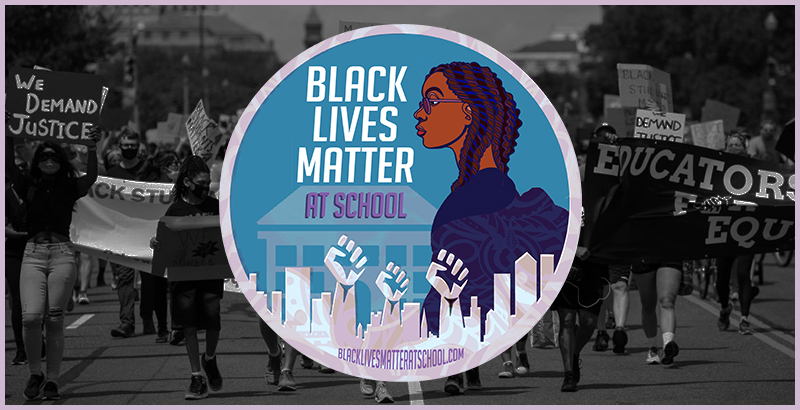
After a summer in which millions of Americans took to the streets to protest racial injustice after the killing of George Floyd, students and teachers across the country this week took to their classrooms — whether virtual or in-person — to affirm that Black lives matter in school.
The national Week of Action, now in its fifth year, coincides with the first week of Black History Month. Organized by a national coalition of educators, the movement, according to its website, encourages teachers, students, parents, unions, and community organizations to engage in activities that address structural racism and affirm the identities of Black students.
“It is necessary to discuss, celebrate and center Black youth, always but now more than ever,” said Shalisa Gladney, coordinator of the Afro-American Cultural Center at the University of Iowa, in a press release published by Black Lives Matter at School-Iowa. “The Week of Action is a start.”
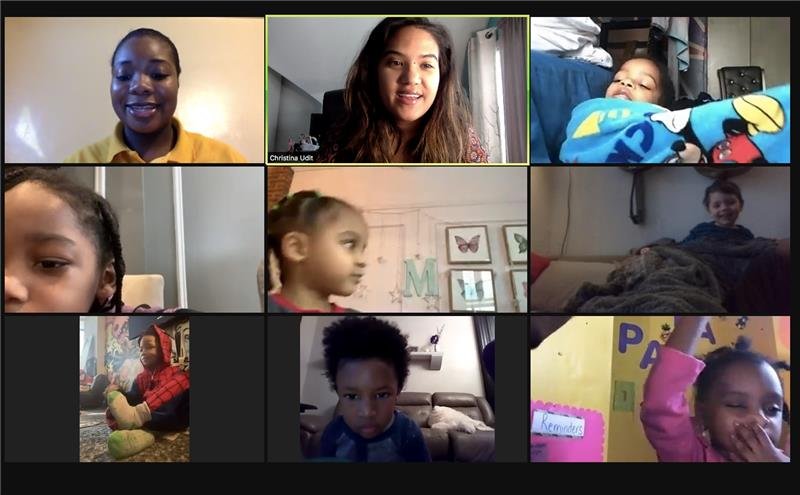
The national coalition shares an extensive archive of lesson plans and poster art for public use. Teachers can peruse an open-access Google Drive folder for math problems examining racial disparities in “Stop and Frisk” policing tactics, history lessons recounting reconstruction, or art projects creating afrofuturist worlds like “Wakanda” from the Black Panther movie.
After modest beginnings as an effort by Seattle educators to raise awareness of racial justice issues, the movement has gone national. This year, after the Black Lives Matter movement saw unprecedented levels of support, events, actions and and lessons took place all across the country, even as many educators were forced to get creative within the constraints of online learning.
Iowa
Gladney’s local chapter of the BLM at School movement organized their own slate of virtual gatherings. Conversations ranged from Black mental health to a community discussion of young people’s most pressing needs, according to the organization’s schedule.
In the evening of Feb. 4, participants logged into a remote career day, and shared, via Zoom chat, their reasons for joining the session. Some had come for tips on the professional world. Others were there simply for the community.
Panelists included the co-founder of the “Black Enlightenment” app, the owner of a local boxing club, and a professor of gender and ethnic studies at the University of Nevada. As the conversation got underway, one student asked what factors the speakers took into consideration when they applied to college.
“Go away — wherever you are,” said Professor Valerie Taylor, who vouched for historically Black institutions like her alma mater, Howard University, but also advised students to consider far away options like Bates College in Maine. Those schools’ need for geographic diversity might give Iowa students an advantage when it comes to scholarship offers, she said. “You will grow…. You will meet people who are not from your world,” said Taylor.
As she spoke, another panelist shot a scholarship link into the meeting chat.
Another student on the call asked panelists for tips on how to navigate predominantly white areas and retain their sense of self-image. Iowa City, where the chapter is based, is about 75 percent white. Black students have used social media sites like the “Black at ICCSD” (Iowa City Community School District) Instagram page to document the harassment they endure daily at school.
A local teacher recalled her experience at a majority-white college where she would look around and think “I don’t see anybody that looks like me.” She persevered, and encouraged students that they could do the same.
“Just know that it is possible,” she told them.
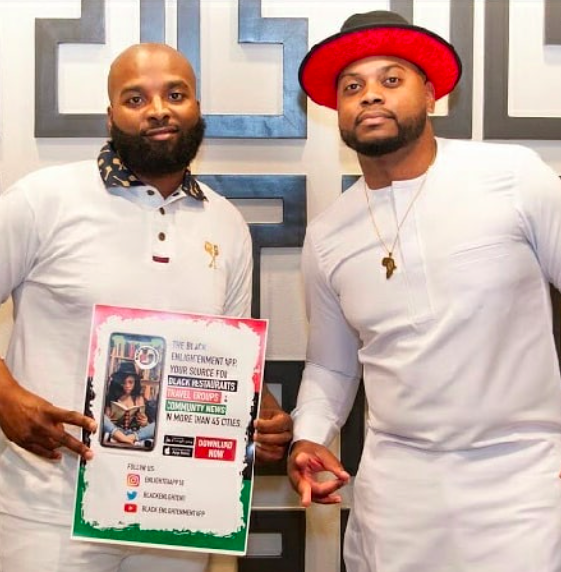
New York City
In the nation’s largest school district, where 25 percent of students are Black, educators documented their planned events on social media, from “Black Superhero Movie Night” to a “‘You Matter’ Kids Summit.”
Some teachers, over Zoom, read picture books written by Black authors, such as Jake Makes a World, by Sharifa Rhodes-Pitts, to their classes. Others streamed performances by Black musical artists — one class watched Jamila Woods on NPR’s Tiny Desk concert series — on YouTube. One teacher even helped her students use a programming software to build interactive digital stories about empathy and inclusion.
At Middle School 35 in Brooklyn, students reflected on what education that affirms Black students might look like.
“We have to come together as a community and stand up against the racial issues that are in school,” said a student who signed as Holiday W.
Rhode Island
In Providence schools, the student union set up an event schedule based on the list that the BLM at School national organization suggested. Michellet Brand, a high school senior and student union leader, appreciates that the sessions raise awareness about racial justice issues.
“It’s this really important time where we highlight Black Lives Matter,” she said. For youth who may not be familiar with concepts like structural racism, the sessions can “really open their eyes to see this perspective and these issues so that they can be a part of the change.”
In one memorable discussion on “diversity and globalism,” facilitators prompted students to reflect on the forces at play in social groupings. “What does diversity in school look like?” they asked. “Do you mostly spend your time in segregated places?”
That line of questions was enlightening for many students, said Brand, who is Hispanic.
“Not a lot of youth realize that, specifically with schools, segregation by law may be illegal, but it still happens,” she said. “It’s still a problem to this day.”
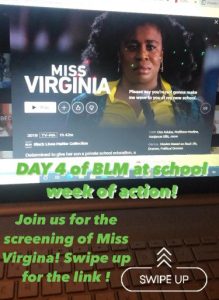
On top of thought-provoking conversations, PSU has included other events in their programming. They hosted a Feb. 4 watch party for the movie Miss Virginia, a 2019 film about an impoverished single Black mother whose struggle to help her son succeed in school leads her into the world of education activism, and plan to host another watch party for Beyoncé’s Black Is King visual album Feb. 5.
The group has harnessed social media to stay in touch with students. Via Instagram story, the young organizers remind youth about the film screenings. They also spur dialogue. On Friday, their story asked followers to respond by “describ[ing] one or more Black women you are connected to,” Brand said.
As important as all the “aha” moments may be, for Brand, the connections she makes with other students of color are the best part of the events, despite the fact that they’re on Zoom.
“Coming together as a community feels really great,” she Brand.
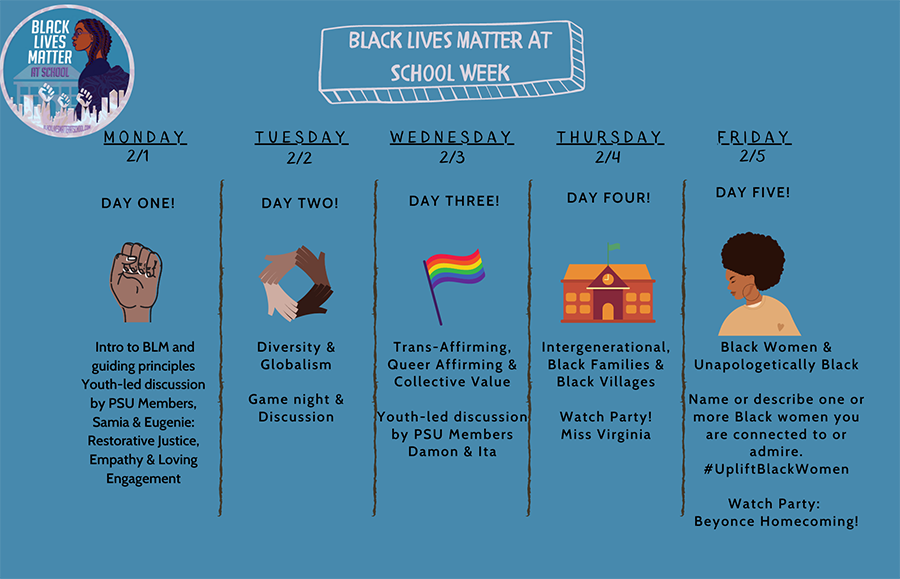
The rest of the year
Amid calls for schools serving majority-Black and Latino student populations to invest in “counselors not cops” in light of research showing unsettling racial gaps in the way campus officers perceive threats, the Week of Action also lined up with National School Counselors Week. Some staff, such as 2019 national school counselor of the year Brian Coleman, of Jones College Prep high school in Chicago, took to social media repping both.
In the aftermath of the Jan. 6 insurrection at the Capitol, teachers across the country have mulled how to best navigate politically charged issues in the classroom. And despite the U.S. Office of Special Counsel having declared in July that support for the national ‘Black Lives Matter’ movement is not partisan or political, a Fox News story on the BLM in School week emphasized the website’s inclusion of quotes from social activist Assata Shakur, who the outlet labels an “FBI most wanted terrorist.” After years working in the civil rights movement, Shakur was convicted of murder in 1977 then escaped prison two years later and remains a fugitive. Many observers, including activist icon Angela Davis, believe Shakur to be innocent and consider her case to be an example of the police brutality and racism many Black women suffer.
On the Black Lives Matter at School movement’s website, the quote from Shakur reads, “We must love each other and support each other. We have nothing to lose but our chains.” Alongside the passage, the organization emphasizes values such as “empathy,” “diversity,” and “fostering a queer‐affirming network” in its list of 13 guiding principles for the Week of Action.
And while Saturday marks the end of 2021’s national Black Lives Matter at School Week of Action, the organization makes it clear that the work does not end. “A week of action. A year of purpose. A lifetime of practice,” the website’s homepage declares as the movement’s motto.
Brand, in Providence, agrees: “Black Lives Matter should be 24/7/365.”
Get stories like these delivered straight to your inbox. Sign up for The 74 Newsletter

;)
